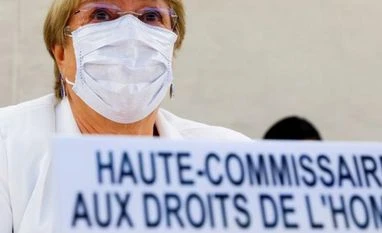As the world mark International Women's Day this week, UN High Commissioner for Human Rights Michelle Bachelet has underlined the need to empower women in Afghanistan, saying that they are "not passive bystanders" and should contribute to the future of their country.
Delivering a statement on Women's Rights in Afghanistan, Bachelet said women of this country are often portrayed in the international fora and media as victims. "In fact, Afghan women have - in the face of war, extreme poverty and unspeakable violence and discrimination - been working tirelessly to protect and provide for their families and communities," she said.
The UN rights chief stated how Afghan women have been attacked for speaking up, and excluded from positions of power and decision-making. "They are not passive bystanders."
For this Afghanistan to find peace and progress, Bachelet argued that Afghan women should be active agents for change and be given the space to lead peacebuilding, humanitarian, and development processes.
"Girls should be able to go to school and university and be empowered to contribute robustly to the future of their country. Women should be visibly represented in the police force, in courts of law, in government and in the private sector - indeed in every sphere of civic and public life," she said.
Condemning all forms of violence against women, she said they have the equal right to demonstrate peacefully without fear of reprisal.
More From This Section
Taliban rule has had a devastating impact on Afghan women and girls, according to several media reports.
Since taking control in August last year, the Taliban have imposed rights-violating policies that have created huge barriers to women's and girls' health and education, curtailed freedom of movement, and deprived many of earned income.
On Tuesday, the UN in Afghanistan expressed solidarity with Afghan women and girls as they face the consequences of multiple crises, combined with entrenched gender inequality and discrimination.
The UN Mission in a statement said that women in Afghanistan are disproportionately impacted by a legacy of conflict, in addition to drought and the collapsing economy, which has plunged millions in Afghanistan into debt and humanitarian need.
"What we are witnessing today in Afghanistan is a crisis of catastrophic proportions. Everyone in the country is affected by the current crises, but the situation for women and girls is particularly concerning as their rights and access to opportunities have become increasingly challenged," said Deborah Lyons, the Secretary-General's Special Representative (SRSG) for Afghanistan.
)